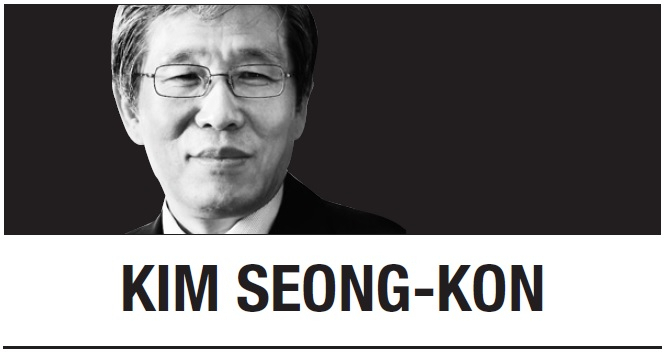
The worst tragedies of human history tend to arise from our too-rigid notions of binary oppositions and our hatred of the other. The antagonisms between the East and the West, Christianity and Islam, or capitalism and communism are good examples. History shows us that the atrocities of wars, massacres and genocides are done in the name of God, the righteousness of pure ideology or delusions of racial supremacy.
Recently, I came across a riveting book of poems by the renowned Korean poet Oh Sae-young, entitled “In Search of the Golden Fleece.” Oh’s mesmerizing poems prompted me to ponder the issues mentioned above, as did the subtitle of the book: “Poems on the Silk Road.”
This work by Oh presents the recurring themes of “crossing boundaries,” “exploring the unknown world," and “realizing global fraternity through cultural diversity and hybridity.” Surely, these themes illuminate the symbolism of the Golden Fleece and the Silk Road in Oh’s poems.
Indeed, while traveling on the Silk Road, Arabian caravans and Chinese merchants not only supplied what the people needed, but also spread different cultures, religions and languages, thereby creating cultural hybridity along their paths. Thus, the Golden Fleece that the poet searches for in his journey may be his realization that cultures constantly blend with one another, making all of us universal brothers and sisters.
Like the Greek mythological hero Jason, Oh Sae-young crosses the border of his country and wanders other lands in a spirit of wonder. The poet’s journey begins in China and expands to all of Asia until he reaches the Bosphorus Bridge in Istanbul, Turkey, which connects the East and the West.
While traveling on the modern-day Silk Road, Oh finds surprising familiarities in seemingly unfamiliar lands due to cultural crossovers and historical disruptions that affect all human beings. It occurs to me that the notion of “sharing vocabulary” is a good example. For instance, the “bul” in Istanbul and Kabul, or the “beol” in Korea’s Seorabeol, means a “plain.” In addition, “tan” in Pakistan or Kazakhstan corresponds to the Korean word “ttang,” which means “territory.”
Another precious treasure Oh finds on his quest is freedom from the political and religious ideologies that have chained us for a long time. The poet tells us that freedom from restraining social conventions such as wealth, power or fame is also invaluable in our lives.
Along these lines, in “Maiden Tower,” Oh depicts the suicide of an Azerbaijani princess. As she jumps from a tower due to her forbidden love of her father, a bird flies away, crossing the boundary that prohibits her from soaring into the sky.
In “At the Caspian Sea,” Oh describes himself drinking vodka in Cafe L’Avenue in Baku, the capital of Azerbaijan. Here, the poet recollects the historical sand storms that have swept through this country, located between the East and the West, brought there by Alexander the Great, Genghis Khan, Amir Timur and Osman. Indeed, Baku means the “Village of Winds.”
In “Shangri-La,” Oh chides Marx and Lenin, who had firmly believed that communism could build a paradise on earth. The poet wryly points out the irony that even Shangri-La, identified in myth with utopia, is now under the supervision of the Chinese Communist Party.
In Kazakhstan, Oh finds kimchi made by a "Koreiskii," or a Kazakh citizen of Korean descent. The poet writes that kimchi can be an excellent health food because it ferments together with different elements, such as salt, pepper, garlic and a variety of other ingredients. Like kimchi, the poet says, human beings can ripen their lives by embracing ethnic and cultural diversity.
In Tbilisi, Georgia, Oh mourns those who died as marmots in a lab called the “proletarian tyranny.” The poet compares Lenin to a doctor who massacred whole peoples in his experimental lab by injecting an unproven new medicine called communism into their brains.
In “At the Birthplace of Stalin,” Oh writes that knowledge cannot surpass wisdom, and ideologies cannot suppress freedom. Unfortunately, Stalin believed in his knowledge and ideology religiously, not knowing that “a belief without skepticism is a sin donning a mask.” Finding the Korean national flower “hibiscus” in Stalin’s birthplace, the poet writes: “Flowers bloom with love, not with ideologies.”
In “Armenian Genocide Memorial,” Oh deplores the genocide committed in Armenia in the name of God. He points out that it was the wrongful mentality of “we are Orthodox and they are heathens” that caused the tragic massacre.
In “Crossing the Bosphorus Channel,” Oh once again laments our unjust fixation on destroying those who are different from us, instead of embracing them and coexisting peacefully. Standing on the Third Bosphorus Bridge, also called the Yavuz Sultan Selim Bridge, which was built by Korea’s Hyundai and SK construction companies in 2016, the poet is elated by the symbolic role of South Korea in connecting the East and the West.
Reading “In Search of the Golden Fleece,” we come to realize what a marvelous task poet Oh Sae-young has accomplished in his insightful, thought-provoking Silk Road poems.
Kim Seong-kon
Kim Seong-kon is a professor emeritus of English at Seoul National University and a visiting scholar at Dartmouth College. The views expressed here are the writer’s own. -- Ed.







